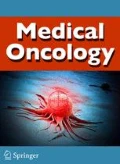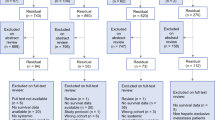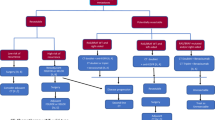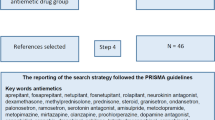Abstract
Toxicities can affect cancer patients’ quality of life resulting in poor adherence to adjuvant chemotherapy (AC). While previous studies have explored the prevalence of toxicities following AC, few have examined the associations of baseline characteristics, such as age, sex, and performance status, with toxicity outcomes. In this study, we reviewed a cohort of 371 colorectal cancer patients treated with adjuvant monotherapy (capecitabine ) or combination therapy (FOLFOX or CAPOX) within 12 weeks of curative resection, and determined the associations between baseline characteristics and toxicity outcomes. Median age was 65 years, 52% were men, and 41% received monotherapy. A number of toxicities appeared to decrease with successive AC cycles. For monotherapy, univariate analyses found that age, sex, performance status, and pre-treatment anemia were associated with hematological toxicities whereas tumor location was associated with gastrointestinal (GI) toxicities (all P < 0.05). On multivariate analyses, hematological toxicities were predicted by advanced age (≥ 70) (OR 3.30; 95% CI 1.17–9.37; P = 0.025) and pre-treatment anemia (OR 23.18; 95% CI 6.36–84.48; P < 0.001), while GI toxicities were less likely to occur among tumors at or distal to the splenic flexure (OR 0.38; 95% CI 0.15–0.99; P = 0.047). For combination therapy, sex and pre-treatment anemia were associated with hematological toxicities (all P < 0.05), but only female sex was predictive on multivariate analyses (OR 5.13; 95% CI 2.08–12.68; P < 0.001). In conclusion, few baseline characteristics were associated with treatment toxicities. These findings may better inform discussions with patients and caregivers during AC decision-making and underscore to clinicians the need for close monitoring of patients during treatment.

Similar content being viewed by others
References
Ferlay J, Soerjomataram II, Dikshit R, Eser S, Mathers C, Rebelo M, et al. Cancer incidence and mortality worldwide: sources, methods and major patterns in GLOBOCAN 2012. Int J Cancer 2014;136:E359–86.
Hameed H, Cassidy J. Use of capecitabine in management of early colon cancer. Cancer Manag Res. 2011;3:295–9.
Loree JM, Mulder KE, Ghosh S, Spratlin JL. CAPOX associated with toxicities of higher grade but improved disease-free survival when compared with FOLFOX in the adjuvant treatment of stage III colon cancer. Clin Colorectal Cancer 2014;13:172–7. https://doi.org/10.1016/j.clcc.2014.01.001.
Ardavanis AS, Ioannidis GN, Orphanos GS, Rigatos GA. Salvage treatment with single-agent capecitabine in patients with heavily pretreated advanced colorectal cancer. Anticancer Res. 2006;26:1669–72.
Stein A, Quidde J, Schroder JK, Gohler T, Tschechne B, Valdix A-R, et al. Capecitabine in the routine first-line treatment of elderly patients with advanced colorectal cancer—results from a non-interventional observation study. BMC Cancer 2015;16:82. https://doi.org/10.1186/s12885-016-2113-8.
Van Erning FN, Razenberg LGEM, Lemmens VEPP, Creemers GJ, Pruijt JFM, Maas HAAM, et al. Intensity of adjuvant chemotherapy regimens and grade III–V toxicities among elderly stage III colon cancer patients. Eur J Cancer 2016;61:1–10. https://doi.org/10.1016/j.ejca.2016.03.074.
Zhao G, Gao P, Yang KH, Tian JH, Ma B. Capecitabine/oxaliplatin as first-line treatment for metastatic colorectal cancer: a meta-analysis. Color Dis. 2010;12:615–23.
Law C-C, Fu Y-T, Chau K-K, Choy T-S, So P-F, Wong K-H. Toxicity profile and efficacy of oral capecitabine as adjuvant chemotherapy for Chinese patients with Stage III colon cancer. Dis. Colon Rectum 2007;50:2180–7.
Stathopoulos GP, Koutantos J, Lazaki H, Rigatos SK, Stathopoulos J, Deliconstantinos G. Capecitabine (Xeloda) as monotherapy in advanced breast and colorectal cancer: effectiveness and side-effects. Anticancer Res. 2007;27:1653–6.
Quidde J, Arnold D, Stein A. Clinical management of localized colon cancer with capecitabine. Clin Med Insights Oncol. 2012;6:363–73.
Park YS, Ji J, Zalcberg JR, El-Serafi M, Buzaid A, Ghosn M. Oxaliplatin/5-fluorouracil-based adjuvant chemotherapy as a standard of care for colon cancer in clinical practice: outcomes of the ACCElox Registry. Asia–Pac J Clin Oncol. 2015;11:334–42.
Kim CAK, Spratlin JL, Armstrong DE, Ghosh S, Mulder KE. Efficacy and safety of single agent or combination adjuvant chemotherapy in elderly patients with colon cancer: a Canadian Cancer Institute experience. Clin Colorectal Cancer 2014;13:199–206. https://doi.org/10.1016/j.clcc.2014.06.002.
Ko JJ, Kennecke HF, Lim HJ, Renouf DJ, Gill S, Woods R, et al. Reasons for underuse of adjuvant chemotherapy in elderly patients with stage III colon cancer. Clin Colorectal Cancer 2016;15:179–85. https://doi.org/10.1016/j.clcc.2015.09.002.
McCleary NJ, Odejide O, Szymonifka J, Ryan D, Hezel A, Meyerhardt JA. Safety and effectiveness of oxaliplatin-based chemotherapy regimens in adults 75 years and older with colorectal cancer. Clin Colorectal Cancer 2013;12:62–9. https://doi.org/10.1016/j.clcc.2012.09.001.
Ilich AI, Danilak M, Kim C, Mulder KE, Spratlin JL, Ghosh S, et al. Effects of gender on capecitabine toxicity in colorectal cancer. J Oncol Pharm Pract. 2015;22:1–7.
Ali R, Baracos VE, Sawyer MB, Bianchi L, Roberts S, Assenat E, et al. Lean body mass as an independent determinant of dose-limiting toxicity and neuropathy in patients with colon cancer treated with FOLFOX regimens. Cancer Med. 2016;5:607–16.
Ozcelik M, Odabas H, Ercelep O, Yuksel S, Mert AG, Aydin D, et al. The efficacy and safety of capecitabine plus bevacizumab combination as first-line treatment in elderly metastatic colorectal cancer patients. Clin Transl Oncol. 2016;18:617–24.
Vrdoljak E, Omrčen T, Boban M, Hrabar A. Phase II study of bevacizumab in combination with capecitabine as first-line treatment in elderly patients with metastatic colorectal cancer. Anticancer Drugs 2011;22:191–7.
Meyerhardt JA, Catalano PJ, Haller DG, Mayer RJ, Macdonald JS, Benson AB, et al. Impact of diabetes mellitus on outcomes in patients with colon cancer. J Clin Oncol. 2003;21:433–40.
An MS, Yoo JH, Kim KH, Bae KB, Choi CS, Hwang JW, et al. T4 stage and preoperative anemia as prognostic factors for the patients with colon cancer treated with adjuvant FOLFOX chemotherapy. World J Surg Oncol. 2015;13:64.
Goldstein D, Mitchell P, Michael M, Beale P, Friedlander M, Zalcberg J, et al. Australian experience of a modified schedule of FOLFOX with high activity and tolerability and improved convenience in untreated metastatic colorectal cancer patients. Br J Cancer 2005;92:832–7.
Hirsch BR, Yousuf Zafar S. Capecitabine in the management of colorectal cancer. Cancer Manag Res. 2011;3:79–89.
Lou Y, Wang Q, Zheng J, Hu H, Liu L, Hong D, et al. Possible pathways of capecitabine-induced hand–foot syndrome. Chem Res Toxicol. 2016;29:1591–601.
Cassidy J, Misset J-L. Oxaliplatin-related side effects: characteristics and management. Semin Oncol. 2002;29:11–20.
Jeon H-J, Woo J-H, Lee H-Y, Park K-J, Choi H-J. Adjuvant chemotherapy using the FOLFOX regimen in colon cancer. J Korean Soc Coloproctol. 2011;27:140–6.
Hofheinz R-D, Heinemann V, von Weikersthal LF, Laubender RP, Gencer D, Burkholder I, et al. Capecitabine-associated hand–foot–skin reaction is an independent clinical predictor of improved survival in patients with colorectal cancer. Br J Cancer 2012;107:1678–83.
Owusu C, Cohen HJ, Feng T, Tew W, Mohile SG, Klepin HD, et al. Anemia and functional disability in older adults with cancer. J Natl Compr Canc Netw. 2015;13:1233–9.
Fjørtoft I, Furnes B, Hausken T, Storli KE, Eide GE, Søndenaa K. Pre-operative anemia in colon cancer patients became normal after more than a year post-operatively but did not influence oncological outcome in the final analysis. Scand J Gastroenterol. 2013;48:663–71.
Hacibekiroglu I, Kodaz H, Erdogan B, Turkmen E, Uzunoglu S, Cicin I. Comparative analysis of the efficacy and safety of oxaliplatin plus 5-fluorouracil/leucovorin (modified FOLFOX6) with advanced gastric cancer patients having a good or poor performance status. Asian Pac J Cancer Prev. 2015;16:2355–9.
Baek KK, Lee J, Park SH, Park JO, Park YS, Lim HY, et al. Oxaliplatin-induced chronic peripheral neurotoxicity: a prospective analysis in patients with colorectal cancer. Cancer Res Treat. 2010;42:185–90.
Funding
None.
Author information
Authors and Affiliations
Corresponding author
Ethics declarations
Conflict of interest
None.
Ethical approval
All procedures performed in this study involving human participants were in accordance with the Ethical Standards of the Institutional and/or National Research Committee and with the 1964 Helsinki Declaration and its later amendments or comparable ethical standards. Specifically, the Health Research Ethics Board (HREB) approved this study before its conduct.
Informed consent
Because this study was a secondary analysis of retrospective data, there was no direct contact with any participants. Therefore, informed consent was waived by the Ethics Committee.
Electronic supplementary material
Below is the link to the electronic supplementary material.
Rights and permissions
About this article
Cite this article
Watanabe, A., Yang, C.C. & Cheung, W.Y. Association of baseline patient characteristics with adjuvant chemotherapy toxicities in stage III colorectal cancer patients. Med Oncol 35, 125 (2018). https://doi.org/10.1007/s12032-018-1188-2
Received:
Accepted:
Published:
DOI: https://doi.org/10.1007/s12032-018-1188-2




